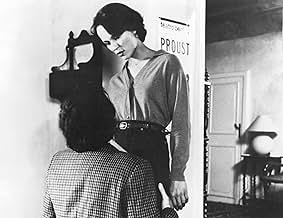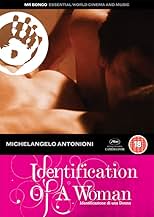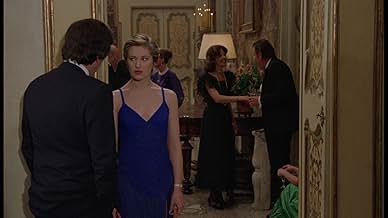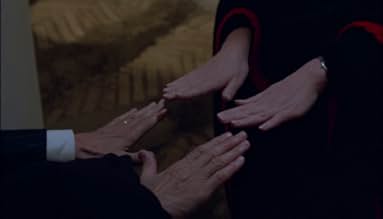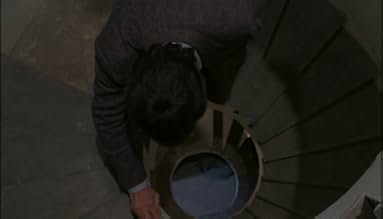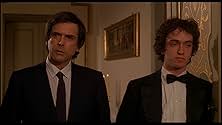CALIFICACIÓN DE IMDb
6.7/10
3.4 k
TU CALIFICACIÓN
Agrega una trama en tu idiomaA director's wife leaves him. He pursues another woman who also departs. This inspires a movie idea about women's relationships. He searches for an actress to star in the film and his life.A director's wife leaves him. He pursues another woman who also departs. This inspires a movie idea about women's relationships. He searches for an actress to star in the film and his life.A director's wife leaves him. He pursues another woman who also departs. This inspires a movie idea about women's relationships. He searches for an actress to star in the film and his life.
- Dirección
- Guionistas
- Elenco
- Premios
- 1 premio ganado y 5 nominaciones en total
Enrica Antonioni
- Nadia
- (as Enrica Fico)
Giampaolo Saccarola
- The Gorilla
- (as Gianpaolo Saccarola)
Dado Ruspoli
- Mavi's Father
- (as Alessandro Ruspoli)
Pier Francesco Aiello
- Young Man at Party
- (as Pierfrancesco Aiello)
Carlos Alberto Valles
- Close-Up Man
- (as Carlos Valles)
Opiniones destacadas
Antonioni's last film prior to his suffering a stroke is this very typical effort (co-written with Gerard Brach and Tonino Guerra), dealing with a number of key themes that run through his work – lack of communication, the mystery-as-journey-of-self-discovery, etc. That said, the film wasn't picked up for U.S. release until 1996 and is consequently perhaps the least-seen of Antonioni's films from his post-AVVENTURA phase!
Anyway, the mystery element links the film with the director's earlier BLOW UP (1966) and THE PASSENGER (1975); still, it's never as intriguing here as in those more celebrated titles (especially since, for once, it's explained away at the end!) but, as I said, the film eventually emerges to be more about the mid-life crisis of its central character (despite the title). Interestingly, he's a film director – though "Euro-Cult" favorite Tomas Milian feels as incongruous to Antonioni's cinema as Marcello Mastroianni's presence had been in LA NOTTE (1961)! He has an obsessive relationship with a young woman (even enjoying some LAST TANGO IN Paris [1972]-type sex scenes!) who eventually leaves him and disappears (shades also of L'AVVENTURA [1960]); while searching for her, he meets a variety of other willing girls (among them Antonioni's own future wife Enrica Fico). Marcel Bozzuffi appears in one brief, irrelevant scene as Milian's brother.
Overall, the film is tiresomely long and often mirrors the tedium experienced by the characters; the ending, however, is a beauty – suggesting that, even if he's a failure at love, a film director is still left with his imagination. Carlo Di Palma's cinematography is notable, too – particularly at the Venice location (where, coincidentally, I saw the Antonionis three years ago!) and during the tense fog-bound sequence; the film's score, then, is a mix of electronic, ambient and pop – and all very much of its period. As was the case with THE PASSENGER, THE MYSTERY OF OBERWALD (which is now one of only two features by the director I've yet to catch up with!) and BEYOND THE CLOUDS (1995), Antonioni had a hand in the editing of the film; here, he receives sole credit for this and the result makes especially effective use of ellipses (the factors of time and space had always been a primary concern in his work – thus making the apparently mocking recourse to science-fiction at the end anything but coincidental!).
Anyway, the mystery element links the film with the director's earlier BLOW UP (1966) and THE PASSENGER (1975); still, it's never as intriguing here as in those more celebrated titles (especially since, for once, it's explained away at the end!) but, as I said, the film eventually emerges to be more about the mid-life crisis of its central character (despite the title). Interestingly, he's a film director – though "Euro-Cult" favorite Tomas Milian feels as incongruous to Antonioni's cinema as Marcello Mastroianni's presence had been in LA NOTTE (1961)! He has an obsessive relationship with a young woman (even enjoying some LAST TANGO IN Paris [1972]-type sex scenes!) who eventually leaves him and disappears (shades also of L'AVVENTURA [1960]); while searching for her, he meets a variety of other willing girls (among them Antonioni's own future wife Enrica Fico). Marcel Bozzuffi appears in one brief, irrelevant scene as Milian's brother.
Overall, the film is tiresomely long and often mirrors the tedium experienced by the characters; the ending, however, is a beauty – suggesting that, even if he's a failure at love, a film director is still left with his imagination. Carlo Di Palma's cinematography is notable, too – particularly at the Venice location (where, coincidentally, I saw the Antonionis three years ago!) and during the tense fog-bound sequence; the film's score, then, is a mix of electronic, ambient and pop – and all very much of its period. As was the case with THE PASSENGER, THE MYSTERY OF OBERWALD (which is now one of only two features by the director I've yet to catch up with!) and BEYOND THE CLOUDS (1995), Antonioni had a hand in the editing of the film; here, he receives sole credit for this and the result makes especially effective use of ellipses (the factors of time and space had always been a primary concern in his work – thus making the apparently mocking recourse to science-fiction at the end anything but coincidental!).
This feels a little bit like "Antonioni For Dummies". Although there are some mysteries and ambiguities, for the most part it's rather plainly laid out and not as enigmatic as his more highly-regarded works. Which isn't to say it's a bad movie. It drags quite a bit, but there are some intriguing parts. The highlight is the fog-shrouded centerpiece of the film... a rather blunt metaphor, but still eerie and compelling. The ending is also a treat. The cinematography by Carlo Di Palma is excellent, perhaps even surpassing his work on RED DESERT. And the soundtrack, though it will probably sound dated to most, is full of stuff I like -- OMD, Tangerine Dream, Steve Hillage. Overall, the film is engaging, but only intermittently so. The first half is more rewarding with all its paranoia... things fizzle out more in the second part.
Antonioni's "The Passenger" is probably my favorite film. It's a singular work which manages to have the highest philosophical ambitions without seeming the least pretentious. That's not to say that Antonioni never seems pretentious. He sometimes is very much so, and this is a case in point. I wouldn't describe this as a good movie exactly- it's a bit too self-absorbed, with some lousy dialog and a howlingly funny leading man, who seems like an SNL parody of an Italian leading man. But having said that, it's still vintage Antonioni, and he was a master. For every moment that makes a fan wince, there are others of exceptional compositional beauty: street scenes in which "extras" take on inarticulable metaphysical weight, moments, such as a scene where the protagonist is lost in fog, that seem to depict the invisible. The theme of the film could seem misogynistic, and in a way it is. But really, this film is about the unknowability of the Other, and the way that black hole nonetheless illuminates Being.
It is easy to see why Michaelangelo Antonioni is a divisive director. Personally appreciate him (if not love) highly and love a fair few of his films, his directing style is unique, his themes are fascinating and there are many transfixing moments in his films (some amazing final shots and unforgettable endings for instance). His style and some of his films understandably perplex and alienate others, will admit to not liking all of his films and do feel that a few of his films do have what he can be criticised for.
'L'avventura', 'L'Eclisse', 'The Passenger', 'Le Amiche' and 'La Notte' are examples of great and more Antonioni films, while 'Blow Up' and especially 'Zabriskie Point' left me indifferent. Then there are Antonioni films that fall somewhere in between and not always easy to review. 'Identification of a Woman' is one of those films, though found more good with the film than bad and it is one of those films that was much better on re-watch. Very like 'Red Desert'. There is an awful lot to admire and what is so good about Antonioni's best work is here, generally though for me it's lesser Antonioni and just wanted to be gripped by and connected to it more.
As always with Antonioni, 'Identification of a Woman' is superbly made on a visual level. Have nothing to complain about in regard to the gorgeously vivid cinematography and atmospheric production design with some of the most effective use of fog on film. The music doesn't intrude and in style and utilisation it complements, if not enhances, rather than clashes. The writing is thought-provoking and doesn't ramble.
Did find myself connecting to 'Identification of a Woman' emotionally, even if not fully engaging with it. The film has moments of knowing irony and just as many of genuine poignancy, so certainly was not left cold. The actors passionately engage with their material while providing expressive nuance, there isn't anybody truly mind-blowing (i.e. Monica Vitti in all her Antonioni work) but at least there aren't miscasts (Richard Harris in 'Red Desert') or amateurish leads ('Zabriskie Point').
However, while there isn't any self-indulgence or heavy-handedness, Antonioni's direction doesn't seem as fully committed as it usually is and it comes over as a bit tired. While the story does have emotional investment and is more coherent than the storytelling in 'Blow Up' and 'Zabriskie Point', the ambiguity is still taken too far and there is a lack of clarity.
The themes here have been handled with much more development and freshness in other Antonioni films and the character and relationship development is vague and veering on shallow. Do not mind that there was ambiguity, didn't care though that it felt like there was too much. Pacing is an issue, with the film tending to badly sag in momentum that it becomes sluggish, a problem when some of the story is quite slight.
Overall, above average with many impressive things but somewhere in between by Antonioni standards. 6/10 Bethany Cox
'L'avventura', 'L'Eclisse', 'The Passenger', 'Le Amiche' and 'La Notte' are examples of great and more Antonioni films, while 'Blow Up' and especially 'Zabriskie Point' left me indifferent. Then there are Antonioni films that fall somewhere in between and not always easy to review. 'Identification of a Woman' is one of those films, though found more good with the film than bad and it is one of those films that was much better on re-watch. Very like 'Red Desert'. There is an awful lot to admire and what is so good about Antonioni's best work is here, generally though for me it's lesser Antonioni and just wanted to be gripped by and connected to it more.
As always with Antonioni, 'Identification of a Woman' is superbly made on a visual level. Have nothing to complain about in regard to the gorgeously vivid cinematography and atmospheric production design with some of the most effective use of fog on film. The music doesn't intrude and in style and utilisation it complements, if not enhances, rather than clashes. The writing is thought-provoking and doesn't ramble.
Did find myself connecting to 'Identification of a Woman' emotionally, even if not fully engaging with it. The film has moments of knowing irony and just as many of genuine poignancy, so certainly was not left cold. The actors passionately engage with their material while providing expressive nuance, there isn't anybody truly mind-blowing (i.e. Monica Vitti in all her Antonioni work) but at least there aren't miscasts (Richard Harris in 'Red Desert') or amateurish leads ('Zabriskie Point').
However, while there isn't any self-indulgence or heavy-handedness, Antonioni's direction doesn't seem as fully committed as it usually is and it comes over as a bit tired. While the story does have emotional investment and is more coherent than the storytelling in 'Blow Up' and 'Zabriskie Point', the ambiguity is still taken too far and there is a lack of clarity.
The themes here have been handled with much more development and freshness in other Antonioni films and the character and relationship development is vague and veering on shallow. Do not mind that there was ambiguity, didn't care though that it felt like there was too much. Pacing is an issue, with the film tending to badly sag in momentum that it becomes sluggish, a problem when some of the story is quite slight.
Overall, above average with many impressive things but somewhere in between by Antonioni standards. 6/10 Bethany Cox
First the good. The fog scene. OMG. Incredible. Even if you decide to skip this movie, you should try to find that scene and watch it. Next the bad: ouch dude my brain hurts.
"Identification of a Woman" was the last feature film by master director Michelangelo Antonioni before he suffered a debilitating stroke and lost his ability to communicate. It was also his long-awaited, eagerly-anticipated salivatorily-received return to the cinema of his native Italy after some 15 years making films in the UK & USA. This is a landmark for the fans, and as far as that goes I am... how does one say "fanboi" in Italian?
But wow, this is a difficult film.
Although the story is easy enough to follow (a director searches for the perfect female character for his latest movie whilst personally going through several women in his life), the plot is not the main focus of the movie. Rather, the main focus is on Antonioni's style of storytelling which has always been cryptic and deliberately confounding.
In this case it can be outright frustrating or even infuriating. This is because, unlike Antonioni's earlier Italian works that you probably love him for ("L'avventura", "La notte", "L'eclisse", "Red Desert"), here of course we don't have the wonderfully human Monica Vitti or any of the other interesting characters such as L;eclisse's boy-faced charmer Alain Delon or Red Desert's broodingly introspective Richard Harris. Here the characters are all deliberately wooden personifications of social tiers and personality types. While, yes, that successfully shifts focus to the theme of the film, it makes for a difficult movie watching experience.
Further complicating the experience are some explicit sexual scenes which can be disturbing to watch (a scene of a man aggressively pleasuring a woman with his hand, leaving nothing to the imagination) which was undoubtedly Antonioni's deliberate embracing of the new sexually explicit cinematic style of the 80s. Indeed, a prominent theme in many of his works is that new ways must be forcefully embraced even at the expense of losing our traditions.
So it all fits with what he's saying here. I won't argue with his presentation. I'll just say, wow that was difficult. Other reviewers have noted that you really have to watch this film twice. I'm sure I'll give it another go soon enough. I just need to rest my brain first.
"Identification of a Woman" was the last feature film by master director Michelangelo Antonioni before he suffered a debilitating stroke and lost his ability to communicate. It was also his long-awaited, eagerly-anticipated salivatorily-received return to the cinema of his native Italy after some 15 years making films in the UK & USA. This is a landmark for the fans, and as far as that goes I am... how does one say "fanboi" in Italian?
But wow, this is a difficult film.
Although the story is easy enough to follow (a director searches for the perfect female character for his latest movie whilst personally going through several women in his life), the plot is not the main focus of the movie. Rather, the main focus is on Antonioni's style of storytelling which has always been cryptic and deliberately confounding.
In this case it can be outright frustrating or even infuriating. This is because, unlike Antonioni's earlier Italian works that you probably love him for ("L'avventura", "La notte", "L'eclisse", "Red Desert"), here of course we don't have the wonderfully human Monica Vitti or any of the other interesting characters such as L;eclisse's boy-faced charmer Alain Delon or Red Desert's broodingly introspective Richard Harris. Here the characters are all deliberately wooden personifications of social tiers and personality types. While, yes, that successfully shifts focus to the theme of the film, it makes for a difficult movie watching experience.
Further complicating the experience are some explicit sexual scenes which can be disturbing to watch (a scene of a man aggressively pleasuring a woman with his hand, leaving nothing to the imagination) which was undoubtedly Antonioni's deliberate embracing of the new sexually explicit cinematic style of the 80s. Indeed, a prominent theme in many of his works is that new ways must be forcefully embraced even at the expense of losing our traditions.
So it all fits with what he's saying here. I won't argue with his presentation. I'll just say, wow that was difficult. Other reviewers have noted that you really have to watch this film twice. I'm sure I'll give it another go soon enough. I just need to rest my brain first.
¿Sabías que…?
- TriviaThe last feature film Michelangelo Antonioni made before his debilitating stroke.
- ConexionesFeatured in Tonino Guerra: A Poet in the Movies (2008)
- Bandas sonorasThe Fire Inside
Written by Steve Hillage and Monique Giraudy (as Miquette Giraudy)
Performed by Steve Hillage
Published by Virgin Music Publishers
Selecciones populares
Inicia sesión para calificar y agrega a la lista de videos para obtener recomendaciones personalizadas
- How long is Identification of a Woman?Con tecnología de Alexa
Detalles
- Fecha de lanzamiento
- Países de origen
- Idiomas
- También se conoce como
- Identification of a Woman
- Locaciones de filmación
- Productoras
- Ver más créditos de la compañía en IMDbPro
Taquilla
- Total a nivel mundial
- USD 1,605
Contribuir a esta página
Sugiere una edición o agrega el contenido que falta

Principales brechas de datos
By what name was Identificazione di una donna (1982) officially released in India in English?
Responda
